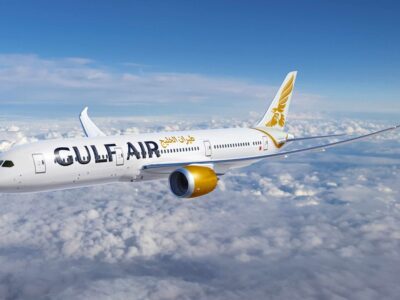|~|Emirates-Trade-Net—large.gif|~|More than 4000 travel agencies in the Middle East and Asia now use Emirates Holidays’ TradeNet system, which gives them access to quotations, flight and hotel reservations, tailor-made holidays and package quotations|~|Arguably the most important tool at the disposal of any travel agent in the Middle East is the GDS, and fierce competition between the main providers of these systems is ensuring agencies have the best solutions on the market.
“The GDS is a universal piece of technology that reaches every travel agency in the region,” says Ian Wallace, sales manager Middle East, for car rental company, Alamo.
“It puts smaller travel agents on a level playing field with the bigger companies, because it means they all have access to the same information and have the same technology available.”
But according to industry professionals such as Wallace, some agencies are not fully exploiting GDS systems. Neither are they harnessing new technology to book highly lucrative commissionable extras.
This is not the only cause of frustration for the providers; as the rest of the world grows accustomed to online booking and buying and the Middle East slowly catches on to this trend, many suppliers such as hotels and car rental companies are introducing their own online booking systems.
In response, GDS providers have developed their own online solutions, many of which offer their customers real time information on flight, hotel rooms and car hire availability, as well as instant booking tools.
The science of service
The term global distribution system conjures to mind four major technology providers that are active in the Middle East: Galileo, Sabre, Amadeus and Worldspan.
Each has recently developed new systems and tools to facilitate the booking and reservation service for their customers.
Galileo Emirates, the undisputed giant of the GDS clan in the Middle East, has been expanding its own list of services to cement its grip on the market.
The company boasts a massive 75% share of the Middle East market, the biggest percentage of any GDS provider worldwide, according to Naz Nizari, senior vice president, Galileo Emirates.
Breaking down these figures by country, Galileo has a 95% market share in Saudi Arabia, 60% in Lebanon, 60 to 65% in Egypt, and nearly 100% in Jordan, while the percentage reaches the high eighties in Dubai and the Northern Emirates.
“Galileo is available in around 120 or 130 markets worldwide, so when a small supplier signs up, its product is available in all those countries around the world,” explains Nizari.
Staying in touch with the market is an essential skill for any business, especially in such a rapidly changing industry as travel.
“We are observing notable changes across the industry,” says Ameen Alibhoy, business development manager, Emirates.
GDS systems were born in Europe and the US, and have eventually migrated to the Middle East, he explains.
“When the airlines were born, there were no travel agents; there were only passengers and airlines, so they dealt with each other only,” he says. “But in this age of the internet, whatever is born in one place is available immediately anywhere else.
“What has worked for us is investing in our people, products, training, and our value adds; the kind of stuff that the customer is always looking for.
“We have an obligation to our industry and the travel agent community, and we’re going to keep delivering whatever the market wants.”
But recent shifts in loyalties serve to indicate that Galileo could be losing its grip on the market. The recent decision by one of the UAE’s major travel agency chains, Sharaftravel, to end its 15-year relationship with Galileo ||**|||~|Sari.gif|~|Vähäkoski: the Middle East is one of the fastest growing markets for GDS provider Amadeus.|~|and switch to Sabre indicated that while Galileo has had an iron grip on the regional market for some years, it is starting to face stiff competition from its closest rivals, namely Sabre and Amadeus.
THE Cutting edge
The Bahrain-based GDS provider, Sabre Travel Network Middle East is a joint venture between US company Sabre Inc and regional carrier, Gulf Air, which was established in January 2005.
Although it is still a relative newcomer to the market, Sabre is firing on all cylinders in terms of the products and user-friendly systems it has recently developed, which look set to shake up the market.
Sabre has taken a big leap forward by introducing My Sabre, which allows agents to log on to the GDS from any computer terminal that is connected to the internet worldwide.
“We have been witnessing a move from traditional GDS models to internet-based systems over the last few years,” explains Quintin Scholtz, Sabre regional manager for the UAE and Oman.
“A lot of booking content is going through the internet now, but Sabre is already online so we are one step ahead of the game.”
Scholtz says Sabre hopes to achieve growth by focusing on improving the quality of the services, rather than trying to grab the biggest market share possible.
“Why bring in more business if the service is not there?” he asks. “It requires a change in the business methodology. Our focus is on looking at what customers want, because at the end of the day, the travel agents are our most importance clients.”
Sabre has enjoyed well-documented success in the last few months, renewing a long-term contract with Dubai-based Kanoo Travel and winning contracts with key UAE agents such as Sharaftravel, Al Rais Travel and Al Moosa Travel.
“Over the last three years we have zoned our activities into segregated markets to focus on their needs, and we have certainly started working to attract opposition business,” says Scholtz.
“Our service offering has been extremely well managed, both our IT services and our account management service.”
According to Scholtz, Sabre has been winning back business that it had previously lost to its competitors, and he says that agencies using more than one system are consolidating and selecting Sabre exclusively.
Sweet symphony
Spanish technology provider, Amadeus entered the MENA market in 1997, and is slowly building up a respectable market share according to Sari Vähäkoski, the company’s director, Middle East & Africa and Central, Eastern & Southern Europe.
“The Middle East is one of our fastest growing regions,” she says. “The big boom for us began around 2000/1 and has carried on ever since. Every year we have added two or three markets to our portfolio, and we now have 15 Amadeus commercial organisations in almost all the regional markets.
“In Africa we have a very strong foothold; we have nearly 50% of the market share which increases the entire portfolio. We entered the African market much earlier than the Middle East, which was the last region we entered worldwide,” she adds.
Vähäkoski is confident market share will continue to increase as Amadeus continues to launch new tools for customers.
“In the Middle East alone the market share is 20%, whereas four years ago it was only 11%,” she explains.
Contrary to trends witnessed in Europe and the US, GDS is still popular in the Middle East, mainly due to the slower take up of internet-based booking systems.
“This is a very competitive market, and now we are seeing that it is becoming far more sophisticated and is opening up to more investment,” says Vähäkoski.
“With Saudi Arabia becoming part of WTO we hope that it will encourage foreign investors to pump more into the country, and that will open up more free competition as well.”
New tools such as the real-time online booking system e-Power are giving travel agents access to up-to-the-minute information about the availability of flights, rooms and car hire.
Like other GDS providers, Amadeus is looking at additional content that customers can sell to add value to their service, including holiday insurance and cruises.
“We have started with [insurance firm] AIG in the region and we are approaching more insurance companies for distribution through Amadeus,” says Vähäkoski. “In the Middle East there is a large number of people who want to go on cruises, and ferries to North Africa are very popular.
“As a content and distribution provider, we need to ensure that we can help travel agencies up-sell other products as well as airline tickets, so they can build up their package for the customer.”
Use it or lose it
But despite all the tools on offer, many agents are slow on the uptake to use them.
“Most travel consultants are only using GDS to 30 or 40% of its capacity,” says Scholtz. “We call them that because they are no longer just ticketing agents; they are travel consultants and business advisors, and they have the means available to them to do just that.”
There is growing concern amongst many travel product suppliers that agents are avoiding booking on the GDS because the procedure is complicated, particular for car rental, according to Bibbs D’Souza, product manager Middle East, Alamo.
“To be honest, it’s a huge task and I don’t blame travel agents because there is so much information to take in and the whole process is very time consuming.
“There is a huge opportunity for Alamo to generate business through GDS, but agents haven’t been trained to do it. On our part, we can teach them to use the correct GDS commands and sell car hire, but generally it’s difficult for managers to send staff for training,” he explains.
“Managers don’t want to send their staff to training because it means they have to have time off work, but it is in our interests to get them to book car hire through every possible means, including GDS.”
||**|||~|Galileo-Emirates—large.gif|~|Naz Nizari and Ameen Alibhoy: Galileo Emirates boasts a 75% market share in the Middle East, where it is well established.|~|Alamo has developed a quick reference guide for travel agents making car hire bookings through each of the major GDS systems. It features all the necessary command codes and gives them five simple questions to ask the customer to ensure they book the car most suited to their needs.
“We should be making travel agents all rounders, but I feel that there are reservations among agents to go beyond what they already do. The majority of managers don’t understand the importance of investing in people, and there is this prevailing resistance to change within the industry,” says D’Souza.
“If the travel agent is not convinced that they have the knowledge available to them to use the system properly and sell the products on offer, then how can the end customer be convinced?”
Around 30% of Alamo’s bookings are GDS generated, and the majority of these are bulk bookings made by corporate clients, he says.
But not all agents can be accused of failing to use the GDS system. Alamo quoted Al Tayer Travel as one agency that channels a large amount of business through the GDS.
“We book everything using the GDS: hotels, car rental, cruises,” says Asef Hussain, the Dubai-based agency’s manager for outbound tours. “We can put together a complete package within about five or ten minutes.”
“Galileo is very convenient and there is so much information that other travel agents don’t utilise, but we manage to incorporate into our packages.
“It’s not rocket science to use; people tend to just figure it out for themselves.”
TradeNet talks
The heat is on for GDS providers to ensure that their services are indispensable as travel suppliers are increasingly devising their own online booking technology, available to travel agencies across the globe.
Tour operators or wholesalers can gear their booking systems towards their target markets and narrow the parameters from which travel agents make their selection so they can focus on the products that suit their requirements.
Emirates Holidays has already cottoned on having launched the TradeNet booking system in 2004. More than 4000 travel agencies in the Middle East and Asia now use the system, which gives them access to quotations, flight and hotel reservations, tailor-made holidays, package quotations, and direct communications with Emirates Holidays.
“We currently receive 60% of our quotations and 50% of our bookings from TradeNet transactions, a clear indication of the comfort level of travel agents with the application, and the extent of their usage,” says Shushant Gupte, business systems & yield control manager, Emirates Holidays.
“It takes care of the two critical components of a holiday package, flights and ground handling services, in one application.”
If systems such as TradeNet, which looks after the needs of the end customer without having to go through a middle man like the GDS, continue to crop up, then companies such as Amadeus, Sabre and Galileo will need to evolve to survive.
“I can only speak for Emirates Holidays as a leisure tour operator, but there are definite indications that many other travel companies in the region are also developing systems that can take them online,” adds Gupte.
“Whether this will be along with, or instead of GDS systems, is something that remains to be seen.”
By continuing to fulfil travel agency requirements and by making sure customers are using their products effectively, GDS providers can maintain a strong presence in the industry and defy the threat from other online booking systems.
“The future is pretty challenging for everybody in travel, but I think we should say that we have been in this business long enough now to know what to do and there is no turning back now; we can only go forward,” says Galileo’s Nizari.
“What we see is pretty rosy though; tough but rosy.” ||**||TOOL TALK|~|Scholtz—large.gif|~|Sabre is focusing its efforts on developing systems to cater to the needs of its users, rather than winning over the market.|~|Galileo Emirates: Galileo Emirates recently launched a branded version of Gullivers Travel Associates’ (GTA’s) online booking system for Middle East-based travel agents.
Available online at www.galileoleisure.com, the leisure travel booking system allows agents to fully integrate air, accommodation, transfers and other ground handling elements such as car rental and excursions, into one single Galileo booking file.
Galileo has teamed up with IHI/BUPA and LifeCare International to offer customers the option of selling medical insurance to the value of US $300,000 for trips of up to one month, with a 28% renewal discount on subsequent years. Travel agents selling the product earn 10% commission on every transaction.
Other services include Galileo Desktop Internet Access, which allows customers to access Galileo through an internet browser, and BOSS4, the new Back Office Sales System used by customers in Bahrain, Oman, Qatar, Kenya, Pakistan and Sri Lanka.
Sabre Travel Network Middle East: the host of services offered by the Bahrain-based Sabre Inc and Gulf Air joint venture include Sabre GDS; My Sabre, a web-based real time booking tool accessible from a single web page; Turbo Sabre, a tool for agencies dealing with high volume bookings; Agency eServices, which provides training and agency marketing tools, and GetThere, an online corporate travel booking tool. It also offers user support and training services, including a training facility and a regional customer contact centre equipped with the latest telephony and AV technology.
Sabre is currently available in 113 countries, and 50,000 travel agency locations worldwide, and expects that number to grow in 2006.
Amadeus: The new e-Commerce tool is a real-time booking engine that allows agents to view up-to-the-minute seat and room availability, guaranteeing the end-user precise information regarding the products that they are buying.
e-Commerce solutions allow airlines to develop personalised websites with online booking engines and data processing applications.
Amadeus is used by around 3400 travel agency locations in the Middle East, and installed on 7500 travel agency terminals.
||**||







